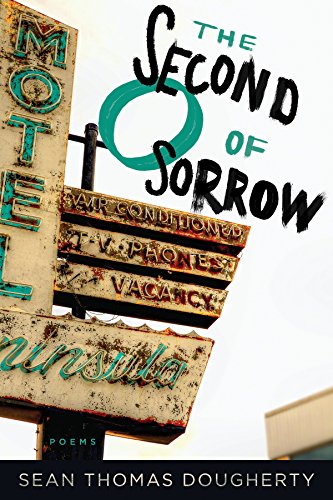The Second O in Sorrow
Format: Kindle Edition
Size of the file: 552 KB
Number of pages in the print edition: 104 pages
Publisher: BOA Editions Ltd. (April 10, 2018)
Sold by: Amazon Media EU S.à r.l.
English language
ASIN: B07BTDVZ84
The Second O in Sorrow is the One that Pulls
Review by Emily Vogel
Poetry Editor
Sean Thomas Dougherty’s most recent collection of poems, “The Second O of Sorrow” (BOA Editions) succeeds most of all in elucidating beauty, even among what is ugly, even among what is disheartening and difficult for a reader to face. In this, he finds moments of transcending what could be considered “ordinary” and rendering it “extraordinary.” The manner in which the poems move assumes a sense of the transience of a day, and yet the turning over of a new one—in a sense each day is a new resurrection, as in the poem “We a New Ledger:”
“I want to rewrite each day after it dies/so it may keep us breathing.”
In this collection, both the speaker and his wife (whom many of the poems are about) endure the obstacles of both life and death. This is evident primarily in the allusions to the “hospital” as in his poem, “We Pay the Rent We Breathe:”
“To say the word orange/is to say a kind of light/the light of our daughter/as she peels an orange/at the hospital, beside your IV’d arm/already beginning to infiltrate/every day the pills/you were—/we were our own exile.”
Much of the first half of the book contends with the speaker’s family, and their struggles in their insular world, which is replete with details transformed into vibrant illustrations and visions. In these first poems, it is as though the ailed wife is at the center of this world, while both the speaker and the daughters orbit through their experiences, even as casualties themselves.
The second half of the book conveys the speaker as a sort of wanderer, who sees the beauty of ordinary characters, such as in “Pittsburgh:”
“The old Italian guy named Frankie who said he knew Roberto Clemente” and “a kid named Juan waiting for the bus.”
Dougherty sees what is gritty and unfortunate in the world he moves through and brings it back “to shape a breath” (Far from Any Classroom) and even turns a dying mother’s hands to “blue as the sky after it has snowed.”
Some of the poems in the book describe drug use as a romance with what is decadent, but also as raw and grotesque. In the poem “Eating Sea Roses in the Afterlife” Dougherty writes:
“And then there were the bandages, and the doctors. Listening to the wounded rain. We fucked like snarling wolves. I swallowed all the pills you gave me.”
While the majority of these poems are prose poems, they display drifting fragments of images which are so powerful that they resonate with the reader long after they have been absorbed. Through a dark lens, Dougherty casts light, as he writes:
“I know to live in this fragile skin/is to be light captured by stained glass.”
This book will lead you to the core of what is real and true, in both heartbreaking and captivating ways. Dougherty chisels at the truth. This book is a must read — it will hit you hard as a bullet, or as Dougherty interrogates:
“Or is the poem the hole that is left when the bullet goes through?”
About the reviewer:
 Emily Vogel is poetry editor of Ragazine.CC. She is the recipient of the Academy of American Poets College Prize, 2008, has been once nominated for a Pushcart, and once nominated for the AWP award in creative non-fiction (2009). She finds solace at home with her husband, the poet and essayist, Joe Weil, their daughter, Clare, and son Gabriel. email: You can read more about her here: https://www.ragazine.cc/about-us.
Emily Vogel is poetry editor of Ragazine.CC. She is the recipient of the Academy of American Poets College Prize, 2008, has been once nominated for a Pushcart, and once nominated for the AWP award in creative non-fiction (2009). She finds solace at home with her husband, the poet and essayist, Joe Weil, their daughter, Clare, and son Gabriel. email: You can read more about her here: https://www.ragazine.cc/about-us.

Recent Comments